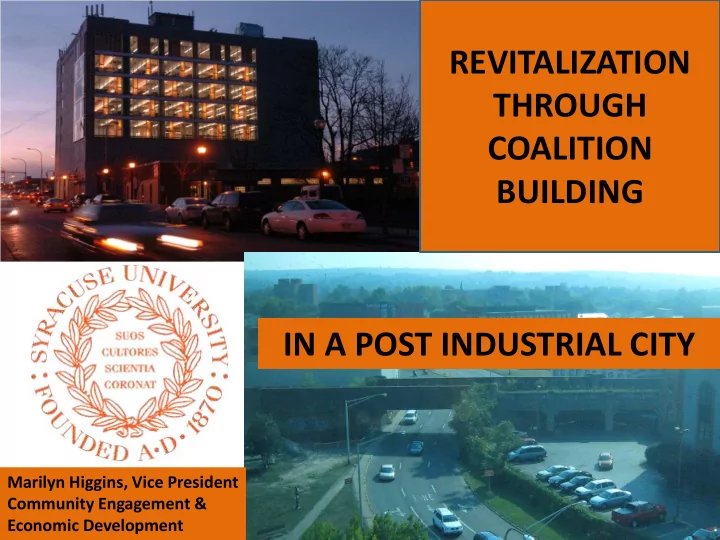

REVITALIZATION THROUGH COALITION BUILDING IN A POST INDUSTRIAL CITY Marilyn Higgins, Vice President Community Engagement & Economic Development
THE SYRACUSE ANCHOR INSTITUTION STRATEGY To stabilize neighborhoods and families in the City of Syracuse, Syracuse University: • Initiates bold projects that address long-standing problems. • Develops solutions that play to our academic strengths. • Builds strong cross-sector partnerships to make the solutions sustainable.
THE SYRACUSE LANDSCAPE University Hill Arts, E. Genesee St. Cultural Symphony Technology & District Place Design Quarter Civic Strip Area Armory Square Near West Side District Syracuse Center of Excellence Clinton Square The Warehouse
BOLD PROJECTS Connective Corridor Near Westside Initiative Say Yes The Warehouse Kaufman Regional Southside Entrepreneurship Innovation Center Center of Excellence
SOLUTIONS – ACADEMIC STRATEGIES Architecture Environmental Sustainability Entrepreneurship Art & Design Information Inclusive Technology Urban Education
CROSS SECTOR PARTNERSHIPS Façade Improvements Save the Rain Neighborhood Revitalization Case Supply Warehouse Global …..home to WCNY and ProLiteracy Entrepreneurship/ Technology
Building a Resilient Neighborhood
Mission Vision Combine the power of art, The revitalization will be fueled technology, and innovation with by interdisciplinary scholarship, neighborhood values and culture international connections, and to revitalize Syracuse’s Near the seed capital and Westside. commitment of Syracuse University. It will be sustained by the residents, businesses, foundations, and the local government of Syracuse. It will infuse arts and innovation, renovate and build new homes, and will create jobs, home ownership opportunities, and beautiful public spaces for the people who live in the neighborhood.
Near Westside Profile • The poorest neighborhood in Syracuse and the 9 th poorest in the country. • 3,310 residents - 31% White, 41% African American, 34% Hispanic • 52% Living in poverty (double that of the City’s rate) • 40% unemployment • 37% with disabilities • Violent crime rate 5 times the county rate • 1,244 housing units, 20% are vacant (double NYS rate) • Owner-occupancy rate of 15% within the 0.33 square mile area (215 acres)
$12M Residential Restoration • Home HeadQuarters: 100 homes acquired; 37 homes completed • Christopher Community: 60 new affordable rental properties • Habitat for Humanity: 9 new homes School of Architecture/Center of Excellence Model Green Home Competition
Near West Side Initiative, Inc. • Diverse, engaged board of directors • Renovating vacant warehouses for artist live/work space • Artist & business relocation • Microloans • “Green Train”—training residents and new immigrants in green building
Overhauling Urban Land Use Case Warehouse Future home of WCNY Public Broadcasting and ProLiteracy International
LaCasita Say Yes to Education 10 Artist Live/Work Units
Rebirth of a City
Engaged Residents
Team Approach
Creative Regeneration
Creative Placemaking
Creating Opportunity Creating Opportunity
Saying Yes to Education This is not one more thing on the plate. This is the plate • First district-wide model – 21,000 students Scholarships for all Syracuse City School District high school • graduates at two dozen private colleges and all SUNY/CUNY • 1,000 Say Yes scholars at 60 different colleges • 127 Say Yes scholars at Syracuse University • Complete wrap-around services, legal clinics, summer camps
A Goal is to Combine the Momentum to Create NEAR WEST SIDE SAY YES INITIATIVE, INC. TO EDUCATION A SAY YES NEIGHBORHOOD After school academic Commercial redevelopment/ enrichment/summer camps business development Tutoring/social/emotional Housing revitalization/ supports/mentorships home ow nership Medical, mental health, Community building/ family supports resident engagement Universal access to Greening the scholarships neighborhood Student monitoring Marketing/ system artist relocation
Student Impact
Research LEED ND GOLD Freewatt Furnace
National Recognition
Quality scholarly research and publicly engaged work are not in opposition. “Universities share the responsibility to address the pressing issues of our times: • Decaying civil infrastructure • Environmental degradation • Failing schools • Beleaguered economies Distressed neighborhoods • • Social divisions …..doing so is good for the scholarly life of faculty, the education of students, and the community.”
Diversity and excellence are not in opposition. “The more we recruit diverse students and faculty, the more they are attracted by the opportunities to get engaged and the better we become as a university.”
Recommend
More recommend